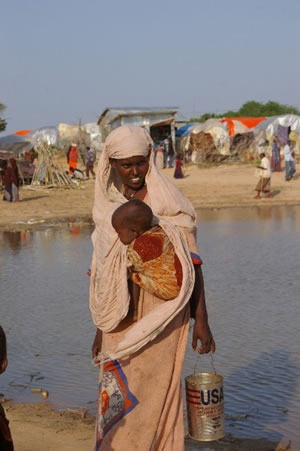
Daria Solovieva | Bio | 29 Nov 2007
World Politics Review Exclusive
 |
| Photo: A woman with a child at the Dr. Hawa Abdi refugee camp, Somalia (Daria Solovieva) |
MOGADISHU, Somalia -- As the United Nations Security Council and secretary general deliberate about whether Somalia is too dangerous for authorizing a larger peacekeeping force, United Nations officials on the ground say the country is facing the worst humanitarian crisis in Africa.
In the last two months, the security situation in the capital city of Mogadishu has steadily deteriorated, forcing over 600,000 refugees to flee the city. One million have been displaced in a country of 7 million, according to the U.N. High Commissioner for Refugees. Camps along the road connecting the market town of Afgooye with Mogadishu alone have received a surge of 200,000 refugees.
Ali Mohamed Said, a chairman at Mogadishu's Bakara Market, the largest in the country, fled the city with his family when his workplace turned into a base for the Ethiopian troops who are fighting alongside the U.S.-backed transitional government against Islamist insurgents. "Everyone who could has fled," he says, "I am living in trees with mosquitoes right now."
At the Dr. Hawa Abdi camp outside Mogadishu there are 6,093 families crammed into makeshift tents made out of clothes and plastic handed out by humanitarian organizations. Escaping from Mogadishu does not end the refugees' problems.
The families are struggling against a kaleidoscope of infectious diseases, including Malaria, Tuberculosis, Cholera and respiratory infections. Twenty percent of the camp's refugees suffer from malnourishment. Among other threats are looting, harassment by the Transitional Federal Government (TFG), rape and intra-camp violence.
We are doing our best, but we need food, medicine, shelters," says Dr. Hawa Abdi, who has managed the camp throughout Somalia's 14-year-old conflict.
Peter Smerdon, the spokesman for the U.N. World Food Programme in Nairobi, says the shortage of humanitarian aid, level of violence, and total number of displaced make Somalia's crisis the most acute on the continent. "For the last four years Somalia had a 17 percent chronic malnutrition rate which makes it worse than Darfur," Smerdon says.
The handful of international organizations still operating in Somalia are struggling to deliver the food to those who cannot escape Somalia or have been turned down at the Kenyan border. Lack of security checkpoints inside Somalia, rampant piracy, and a constantly shifting security environment are among the challenges they face.
These obstacles cause long delays in food deliveries. Many at the Abdi camp have not received any food in a month. The ongoing fighting makes taking care of the dead and wounded difficult. Ader Aza, a patient at the International Committee of the Red Cross-funded Madina hospital, says she lay on a road for an hour after snipers shot her.
The African Union's Ugandan contingent runs a U.N. level-two hospital, which treats civilians as well military personnel. They cannot provide translators to communicate effectively with patients and the civilian population because of limited funding and staff shortages.
The transitional government has not only failed to provide any assistance to the displaced, but is doing actual harm, many say. Critics of the government, including journalists, businessmen and civil society advocates, are subject to routine harassment and arrests. Abdullahi Shirwa, the director of the Somali Peace Network, is hopeful that Somalia's newly appointed prime minister will make a difference because of his background with the Red Cross in humanitarian assistance. "There is a good new opportunity now," he says.
Others are not as optimistic. Said, the chairman of the Bakara market says there are major challenges to overcome on the path to stability, such as the Ethiopians' presence, lack of humanitarian aid, and the lack of trust among Somali people.
Many in Somalia see the ongoing conflict as a problem that requires active international involvement to deliver humanitarian aid, provide security, and enable dialogue between the warring parties. "This war is an international war, a war of terrorism," Said says. "Who will do peace in Somalia if the United Nations is not going to participate?"
Daria Solovieva is a freelance journalist based in Washington.
Source: World Political Review, Nov 29, 2007